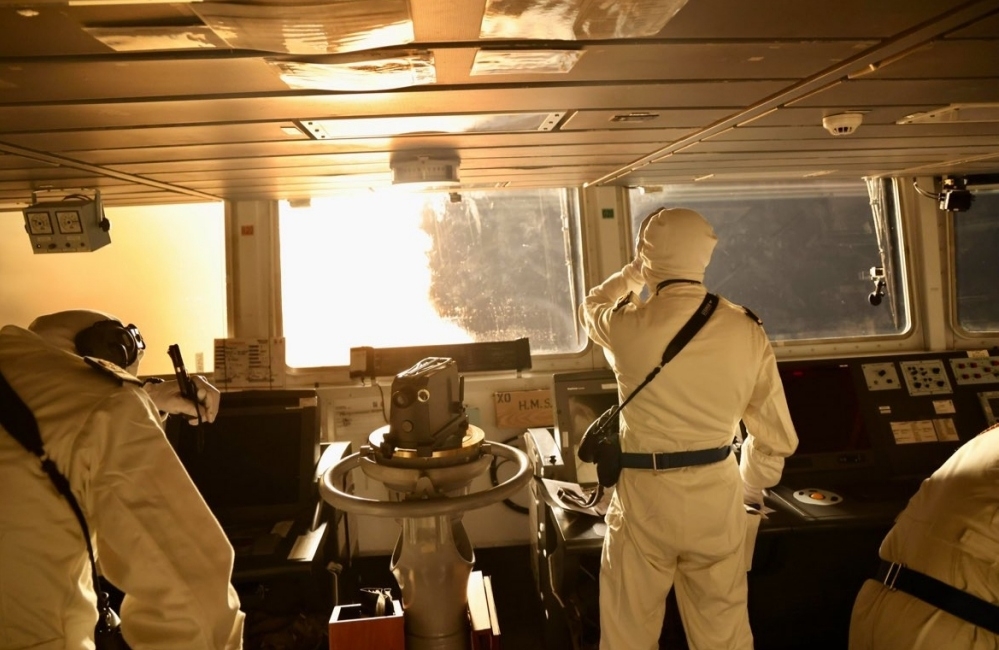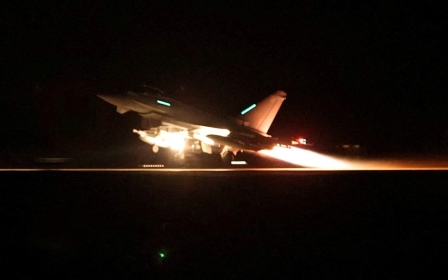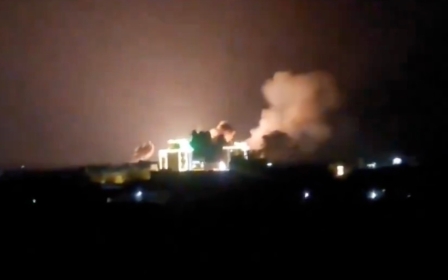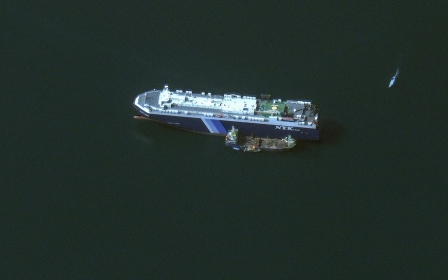War on Gaza: The West's military action against the Houthis is doomed to fail

With more than 68 ships per day passing through the Suez Canal, carrying 12 percent of all goods traded in the world, it has been impossible for the international community to ignore the escalating attacks on merchant shipping in the Red Sea that Yemen's Houthis have launched over the past two months.
In that context, the decision of the US and the UK to take military action against Houthi bases in Yemen was widely predicted.
But what is the strategy behind that action? Will it stop the attacks on shipping, and will it help or hinder stated US objectives of preventing a regional escalation of the war that is devastating Gaza?
Firstly, nobody should be under any illusions about what the Houthis are like. The families of the 150,000 people killed in Yemen’s civil war can attest to their brutality, as well as that of the air strikes on civilian areas carried out by their Saudi-led opponents.
More than 227,000 Yemenis have also died from famine and lack of healthcare during the war. The humanitarian crisis continues to this day, with poverty still at grotesque levels. The fact that public-sector workers in Houthi-controlled areas have not been paid for over seven years also underlines how ordinary Yemenis experience the reality of Houthi rule.
New MEE newsletter: Jerusalem Dispatch
Sign up to get the latest insights and analysis on Israel-Palestine, alongside Turkey Unpacked and other MEE newsletters
In claiming that their actions in the Red Sea are acts of solidarity with Palestinians under siege, there is little doubt that the Houthis are trying to gain legitimacy in the Arab world and to shore up a flagging reputation at home by diverting attention elsewhere.
Their actions also play a useful role in the regional power-play of their main ally, Iran.
All the signs are that this week's US and UK air strikes on Yemen will only further feed these agendas.
Houthis vow retaliation
Yes, the US and UK have the military capability to hit Houthi bases hard and to carry on shooting out of the sky any drones or missiles that continue to get through to attack ships in the Red Sea. But will they be able to eliminate the capacity of the Houthis to carry on firing?
It is already clear that they will not. The Houthis have already vowed to retaliate and launched a further missile attack near the Red Sea within hours of US and UK aircraft returning to their bases.
Follow Middle East Eye's live coverage of the Israel-Palestine war
Remember, thousands of Saudi air strikes were unable to militarily destroy the Houthis throughout Yemen's long-running civil war.
Why should the far more limited air strikes carried out by US and UK forces this week prove any more effective, particularly when the Houthis will still be able to rely on Iran to resupply them with what they need to continue their attacks one way or another?
So, even in military terms, there is a big question mark over whether the US and UK stand any realistic chance of achieving their stated objectives.
But the real danger is far wider than this.
Bluntly, to people across the Middle East and beyond, this week's action by the US and UK reeks of double standards.
Even if people in the region were previously sceptical of the Houthis' claim to be guardians of the Palestinians, now they will ask how western powers can justify taking military action against an act of solidarity with a people under siege when trade is disrupted, yet accept no accountability for their own actions in solidarity with the state conducting the siege.
US support of Israel may not disrupt shipping lanes, but the armaments America has supplied have directly contributed to the deaths of more than 23,000 people in Gaza so far.
For UK and US political leaders now to claim that they had to take action against the Houthis to protect the lives of civilians aboard merchant ships in the Red Sea will seem like rank hypocrisy when they are prepared to allow the continued killing of so many thousands of Palestinian civilians, many of them children, in their own homes a few hundred miles to the north.
The anger this generates across the Middle East is real and it is growing, allowing the Houthis to acquire a perceived legitimacy they don't deserve.
All this, combined with ongoing clashes on Israel's northern border and the possibility of more Israeli assassinations of Hamas or Hezbollah leaders deep inside Lebanon, not only increases the risk of regional escalation, it increases the danger of a new wave of terrorist attacks beyond the Middle East.
Mantra demanding 'action'
Clearly, the attacks in the Red Sea cannot be ignored.
The US, UK and other naval powers have a responsibility to protect shipping, including shooting down missiles that are fired and repelling Houthi attempts to board vessels.
Of course, that cannot be the end of the story. Sooner or later a Houthi missile could get through and lives could be lost.
But this current action by the US and UK has all the hallmarks of policy driven more by the mantra that "something must be done" than by clear strategic thinking about what that "something" should be.
The action by the US and UK has all the hallmarks of a policy driven more by the mantra that 'something must be done' than by clear strategic thinking
All the signs are that, even if scores of Houthi military bases have been seriously degraded this week, the attacks on shipping will continue. When they do, will the US and the UK really want to escalate their tit-for-tat retaliation to the point of all-out war on Houthi-controlled areas of Yemen, with all the geopolitical risks that would involve?
The way to bring the attacks in the Red Sea to an end is to remove the pretext the Houthis use to carry them out and gain domestic and regional legitimacy for themselves.
It means tackling causes, not just symptoms.
Central to that must be a willingness by western leaders to end their double standards over Israel and Palestine. It requires demonstrable pressure, most importantly by the US and its allies, to achieve a permanent bilateral ceasefire between Hamas and Israel to end the bloodshed and secure the release of hostages.
That pressure has to be real - no more diplomatic hand-wringing over the level of civilian casualties that the Netanyahu government chooses to ignore.
Ending the double standards also has to mean consistency in the application of international law.
Yes, that includes holding to account those who attack ships in the Red Sea. It also means calling out war crimes in Israel and Palestine no less explicitly than in Ukraine. And it means requiring compliance with whatever the International Court of Justice may rule on South Africa's application under the Genocide Convention for an injunction to halt Israel's onslaught on Gaza.
International law is meant to be universal. It is beyond time that western political leaders treated it as such.
Doing so is strategically the right thing to do. It is also morally the right thing to do.
The views expressed in this article belong to the author and do not necessarily reflect the editorial policy of Middle East Eye.
This article is available in French on Middle East Eye French edition.
Middle East Eye delivers independent and unrivalled coverage and analysis of the Middle East, North Africa and beyond. To learn more about republishing this content and the associated fees, please fill out this form. More about MEE can be found here.






